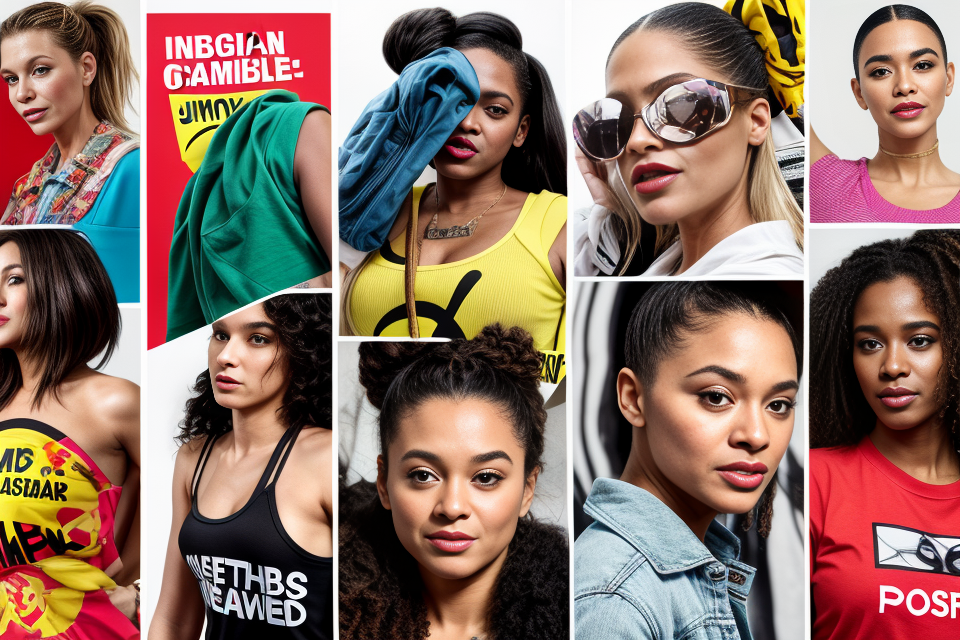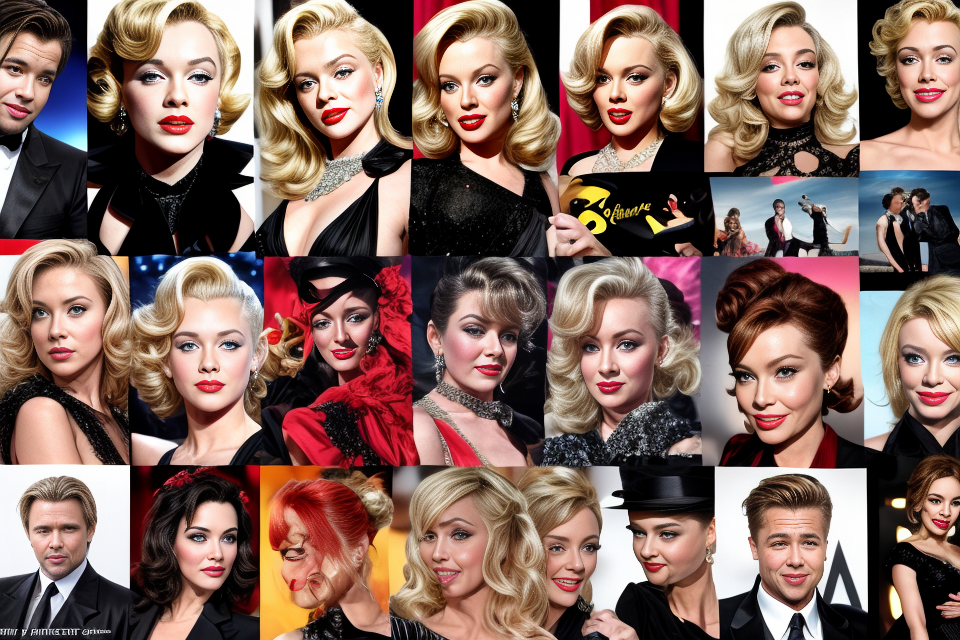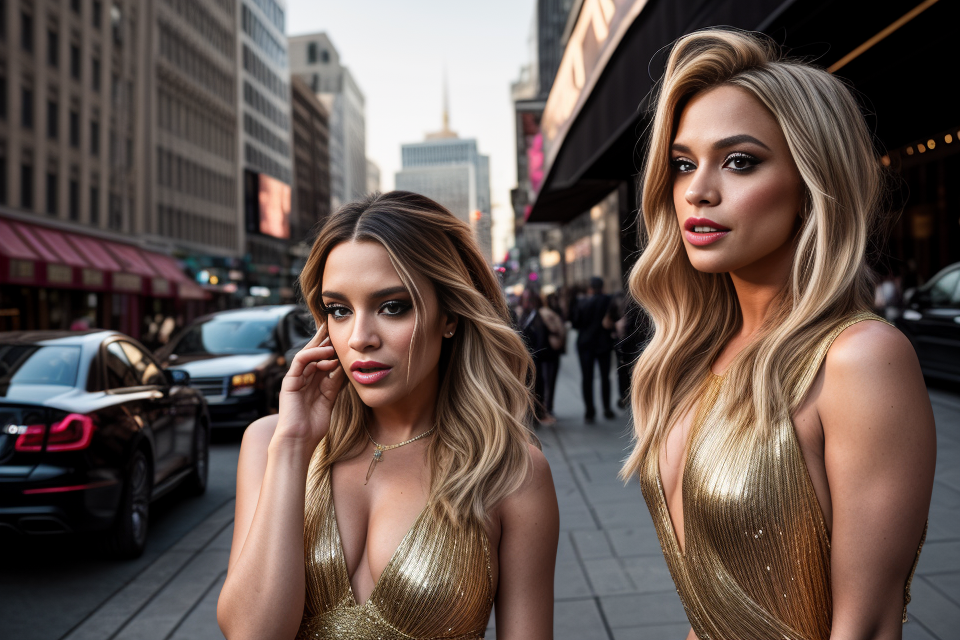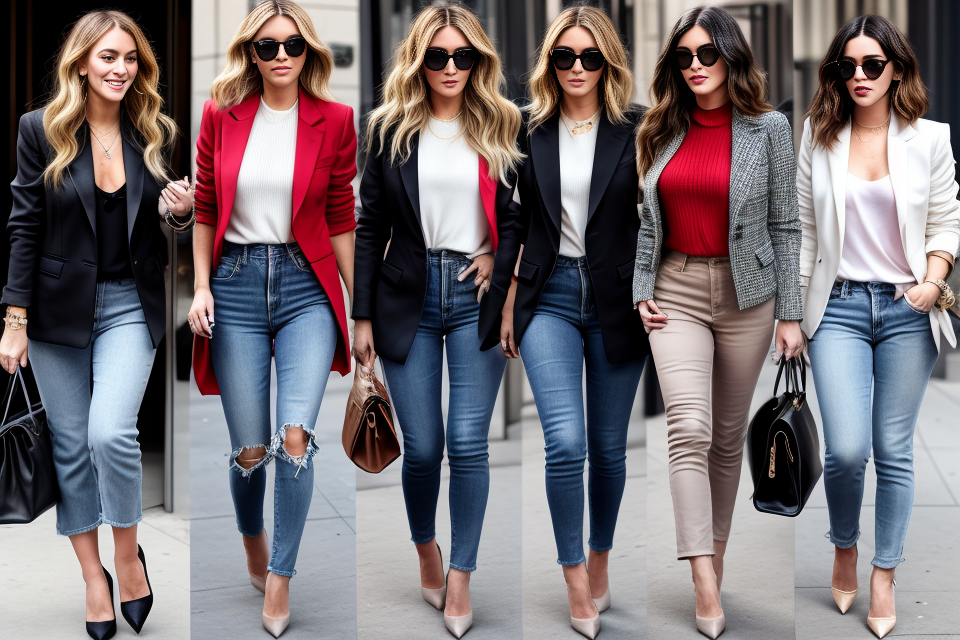Celebrities have always been a major source of inspiration for fashion trends. From the iconic Marilyn Monroe to the modern-day fashionistas like Kendall Jenner, celebrities have been setting the pace for the fashion industry. However, with the rise of fast fashion, the influence of celebrities has become even more prominent. Fast fashion is a relatively new phenomenon that has taken the world by storm. It refers to the rapid production of low-cost, fashionable clothing that is inspired by the latest fashion trends. In this article, we will explore how celebrities impact the fast fashion industry and how their influence has transformed the way we dress.
Celebrities have a significant impact on the fast fashion industry. They are often seen as trendsetters and can influence what products are popular among consumers. When celebrities wear certain clothing brands or styles, it can create a demand for those items, leading to increased sales for the fast fashion industry. Additionally, many fast fashion brands collaborate with celebrities to create exclusive fashion lines, which can further boost sales and increase brand recognition. However, it’s important to note that the fast fashion industry also has a significant environmental impact, and the mass production and disposal of clothing can contribute to pollution and waste.
The role of celebrities in shaping fashion trends
Influence on fast fashion brands
Celebrities play a significant role in shaping fashion trends, and their influence on fast fashion brands is undeniable. They are often seen as trendsetters, and their fashion choices can have a direct impact on the clothing selections of their fans and followers.
One way that celebrities influence fast fashion brands is through endorsements and collaborations. Many fast fashion brands will pay celebrities to wear their clothes or to collaborate on clothing lines. This not only increases the brand’s visibility but also gives the celebrity a cut of the profits.
Celebrities also influence fast fashion brands by emulating their styles. When a celebrity is seen wearing a particular item of clothing, it can quickly become popular among the brand’s customers. This is especially true for younger consumers who may be more likely to follow the fashion choices of their favorite celebrities.
In addition to their direct influence on fast fashion brands, celebrities also shape the broader cultural conversation around fashion. They can help to define what is considered fashionable or stylish, and their choices can have a ripple effect on the fashion industry as a whole.
Overall, the influence of celebrities on fast fashion brands is significant and multifaceted. By endorsing and collaborating with these brands, as well as by emulating their styles, celebrities help to shape the fashion trends that are popular among their fans and followers.
The impact on consumer behavior
Celebrity worship and its effect on fashion choices
- The phenomenon of celebrity worship, where individuals hold unwavering admiration and devotion towards celebrities, has a significant impact on fashion choices.
- Celebrities, as cultural icons, possess a considerable influence on their followers, shaping their preferences and tastes in fashion.
- The idolization of celebrities leads to the adoption of their style by their fans, resulting in the replication of their outfits and accessories.
- This trend, commonly referred to as “fast fashion,” has revolutionized the fashion industry by promoting the quick production and consumption of low-cost, imitative clothing.
The desire for affordable and accessible fashion inspired by celebrities
- The fast fashion industry caters to the desire of consumers for affordable and accessible clothing inspired by celebrities.
- Fast fashion brands have capitalized on the phenomenon of celebrity worship by producing low-cost replicas of celebrity outfits, making fashion trends more accessible to the masses.
- The availability of celebrity-inspired clothing at affordable prices has attracted a broader consumer base, fueling the growth of the fast fashion industry.
- The accessibility of celebrity-inspired fashion has also contributed to the rapid circulation of fashion trends, with new styles being introduced and replaced at an unprecedented pace.
By understanding the impact of celebrity worship on consumer behavior, it becomes evident that celebrities play a crucial role in shaping the fast fashion industry. Their influence on fashion choices has fueled the demand for affordable and accessible clothing, leading to the proliferation of fast fashion. As a result, the fashion industry has undergone a significant transformation, with celebrity-inspired fashion becoming a driving force behind the rapid production and consumption of clothing.
Celebrity-driven fast fashion collections
Advantages and disadvantages of collaborations
Boosting brand image and sales
Celebrity collaborations in the fast fashion industry can have a significant impact on the brand image and sales. When a celebrity endorses a fashion label, it can increase the brand’s visibility and credibility among consumers. The celebrity’s status and influence can draw attention to the brand, which can result in increased sales and revenue. Additionally, these collaborations often create a buzz and excitement around the brand, which can further boost its popularity.
Ethical concerns and environmental implications
While celebrity collaborations can benefit fast fashion brands, there are also ethical concerns and environmental implications associated with these partnerships. Fast fashion companies often prioritize production speed and low prices over ethical and sustainable practices. When collaborating with celebrities, these brands may feel pressure to produce new collections quickly, which can lead to exploitation of workers and poor working conditions. Moreover, the increased production and consumption of fast fashion products as a result of celebrity collaborations can contribute to environmental degradation and waste.
It is important for consumers to be aware of these issues and consider the ethical and environmental impact of their purchasing decisions when buying fast fashion products endorsed by celebrities. Additionally, it is essential for fast fashion brands to prioritize ethical and sustainable practices in their collaborations with celebrities and ensure that the production process does not compromise the well-being of workers or the environment.
Examples of successful celebrity-brand partnerships
- H&M x Balmain
- In 2015, H&M collaborated with the luxury fashion house Balmain to create a capsule collection. The collection was met with widespread acclaim and was considered a major success for both brands.
- The collection was inspired by Balmain’s iconic designs and featured pieces such as a sequined minidress and a statement bomber jacket.
- The collection was sold in over 250 H&M stores worldwide and was available online, with pieces ranging from $20 to $400.
- Zara x Karl Lagerfeld
- In 2015, Zara collaborated with Karl Lagerfeld to create a collection inspired by the designer’s iconic styles.
- The collection was sold in Zara stores worldwide and was available online, with pieces ranging from $50 to $300.
- The collection was a huge success for Zara, with many pieces selling out quickly due to high demand.
- Fashion Nova x Cardi B
- In 2018, Fashion Nova collaborated with rapper Cardi B to create a collection of affordable and trendy clothing.
- The collection was inspired by Cardi B’s personal style and featured pieces such as oversized denim jackets and metallic dresses.
- The collection was a major success for Fashion Nova, with many pieces selling out quickly and leading to the brand’s popularity skyrocketing.
Celebrities as agents of change in the fashion industry
Promoting sustainability and ethical fashion
Celebrities have become influential figures in promoting sustainability and ethical fashion in the fast fashion industry. With their massive following and public influence, they have the power to bring attention to environmental and social issues in the fashion industry. Here are some ways in which celebrities are promoting sustainability and ethical fashion:
Environmental activism and conscious fashion choices
Celebrities are increasingly using their platforms to raise awareness about environmental issues in the fashion industry. Many celebrities have taken to social media to promote sustainable fashion practices, such as reducing waste, reusing clothes, and recycling materials. For example, actress Emma Watson has been a vocal advocate for sustainable fashion, often sharing tips on how to reduce one’s environmental impact through fashion choices.
In addition to promoting sustainable fashion practices, some celebrities are also taking concrete steps to reduce their own environmental impact. For instance, actress Emma Roberts has been seen wearing the same outfit multiple times on social media to promote the idea of reducing waste and overconsumption in the fashion industry. Other celebrities, such as model Gisele Bundchen, have been spotted wearing sustainable fashion brands and attending events that promote ethical and sustainable fashion practices.
Advocating for fair labor practices and ethical production
Celebrities are also using their platforms to advocate for fair labor practices and ethical production in the fast fashion industry. Many celebrities have been vocal about the need for fair wages and safe working conditions for garment workers, particularly in developing countries where much of the fast fashion industry’s production takes place. For example, actresses Emma Stone and Viola Davis have spoken out about the need for fair wages and safe working conditions for garment workers in the fashion industry.
In addition to advocating for fair labor practices, some celebrities are also using their platforms to support ethical fashion brands that prioritize sustainability and ethical production. For instance, actress Olivia Wilde has been seen wearing sustainable fashion brands and has used her platform to promote ethical fashion brands that prioritize sustainability and fair labor practices. Other celebrities, such as actor Leonardo DiCaprio, have invested in sustainable fashion brands and have used their platforms to promote the need for sustainable and ethical fashion practices in the industry.
Overall, celebrities are becoming increasingly influential in promoting sustainability and ethical fashion practices in the fast fashion industry. By advocating for environmental and social issues, supporting sustainable fashion brands, and promoting conscious fashion choices, celebrities are helping to bring attention to the need for a more sustainable and ethical fashion industry.
Challenging traditional beauty standards
Celebrities have always been known for their influence on fashion trends, but they also play a significant role in challenging traditional beauty standards. By pushing boundaries and embracing diversity, they are encouraging the fast fashion industry to follow suit.
- Promoting diverse representation in advertising campaigns
- Fast fashion brands are starting to recognize the importance of diverse representation in their advertising campaigns. By featuring models of different ages, races, and body types, these brands are catering to a wider audience and promoting inclusivity.
- Celebrities such as Rihanna, Beyoncé, and Zendaya have been instrumental in pushing for more diversity in fashion advertising. They have used their platforms to feature models who do not fit the traditional beauty standards, which has encouraged brands to be more inclusive in their campaigns.
- Encouraging the use of plus-size models
- The use of plus-size models has become more prevalent in the fashion industry, thanks in part to the efforts of celebrities like Ashley Graham and Tess Holliday. These models have challenged traditional beauty standards by embracing their curves and showing that beauty comes in all shapes and sizes.
- By featuring plus-size models in their campaigns, fast fashion brands are acknowledging that there is a demand for clothing that caters to a wider range of body types. This shift towards inclusivity is a direct result of the influence of celebrities who have embraced their bodies and encouraged others to do the same.
- Celebrating natural beauty and minimal makeup
- In recent years, there has been a growing trend towards natural beauty and minimal makeup. Celebrities like Emma Watson and Jennifer Aniston have been advocates for this movement, showcasing their natural beauty and encouraging others to do the same.
- Fast fashion brands have taken notice of this trend and are starting to cater to customers who prefer minimal makeup. By featuring models with minimal makeup in their campaigns, these brands are sending a message that natural beauty is beautiful and should be celebrated.
Overall, celebrities are playing a significant role in challenging traditional beauty standards in the fast fashion industry. By promoting diversity, encouraging the use of plus-size models, and celebrating natural beauty, they are pushing the industry to be more inclusive and accepting of all body types.
The dark side of celebrity influence on fast fashion
The perpetuation of consumerism and waste
The fast fashion industry has been significantly influenced by celebrities, who play a crucial role in shaping trends and determining what is considered fashionable. While this can be beneficial for retailers, as it drives sales and keeps consumers interested in new styles, it also has a dark side.
One of the main concerns is the perpetuation of consumerism and waste. Fast fashion, driven by celebrity endorsements and trends, encourages consumers to buy more clothes, even if they do not need them. This leads to an increase in textile waste, as consumers discard clothing that is no longer considered fashionable or trendy.
Furthermore, the fast fashion industry’s focus on speed and low cost often leads to the use of cheap materials and poor production practices. This can result in the production of low-quality clothing that does not last long, further contributing to waste.
Moreover, the fast fashion industry’s reliance on celebrities and influencers to promote their products can create a culture of disposability, where consumers feel pressure to keep up with the latest trends and dispose of old clothes in favor of new ones. This perpetuates a cycle of consumption and waste that is harmful to the environment and unsustainable in the long term.
In conclusion, while celebrities can have a positive impact on the fast fashion industry by promoting sustainable and ethical practices, their influence can also contribute to the perpetuation of consumerism and waste. It is important for consumers to be aware of this and make conscious choices about their purchases, rather than being swayed by celebrity endorsements and trends.
The role of social media in fueling the fast fashion cycle
Social media has played a significant role in fueling the fast fashion cycle. With the rise of platforms like Instagram and TikTok, celebrities have become influencers in their own right, promoting fashion trends and influencing consumer behavior. This has led to a culture of instant gratification, where consumers are encouraged to buy the latest trends as soon as they are made available.
Celebrity-driven content has a significant impact on consumer behavior. When celebrities wear certain fashion items, these items become desirable and sought after by consumers. This creates a demand for fast fashion items that are often poorly made and harmful to the environment. In addition, social media influencers often receive payment or gifts in exchange for promoting certain brands or products, which creates a conflict of interest that can mislead consumers.
The rise of social media has also made it easier for fast fashion brands to reach a wider audience. They can use social media platforms to advertise their products, showcase their latest trends, and connect with consumers directly. This has made it easier for fast fashion brands to reach a global audience and expand their businesses rapidly.
However, the role of social media in fueling the fast fashion cycle also has its downsides. Fast fashion brands often use social media to promote a culture of disposable fashion, where consumers are encouraged to buy more and more items without considering the environmental impact of their purchases. This has led to a significant increase in textile waste and pollution, as well as a rise in cheap labor and exploitation in the fashion industry.
Media literacy and critical consumption are essential in this context. Consumers need to be aware of the ways in which social media influencers and fast fashion brands manipulate them into buying more and more items. They need to be critical of the content they consume on social media and consider the impact of their purchases on the environment and on workers in the fashion industry.
Overall, the role of social media in fueling the fast fashion cycle is complex and multifaceted. While it has enabled fast fashion brands to reach a wider audience and connect with consumers directly, it has also contributed to a culture of disposable fashion and environmental degradation. Consumers need to be aware of these issues and practice media literacy and critical consumption to make more informed and responsible purchasing decisions.
FAQs
1. How do celebrities influence fast fashion?
Celebrities have a significant impact on the fast fashion industry as they are often seen as trendsetters. They are frequently photographed wearing the latest fashion trends, and their style choices can quickly become popular among their fans. As a result, fast fashion brands often replicate celebrity styles, creating cheap versions of designer clothing and accessories. This has led to criticism of the fast fashion industry for profiting from the creativity and hard work of designers and fashion houses.
2. How do fast fashion brands benefit from celebrity endorsements?
Fast fashion brands often use celebrity endorsements to promote their products and increase sales. By partnering with popular celebrities, fast fashion brands can reach a wider audience and tap into their fan base. Celebrities may wear the brand’s clothing and accessories in public appearances, post about the brand on social media, or even design their own lines for the brand. This can help to increase the brand’s visibility and credibility, leading to more sales and profits.
3. Is it ethical for fast fashion brands to replicate celebrity styles?
There is significant debate around the ethics of fast fashion brands replicating celebrity styles. Some argue that it is a form of theft, as the designs are often based on the work of established designers and fashion houses. Others argue that it is a way for fast fashion brands to offer affordable versions of designer clothing to consumers who may not be able to afford the original. Ultimately, the decision to replicate celebrity styles is a business decision made by fast fashion brands, and consumers can choose to support or boycott these brands based on their own values.
4. How do celebrities feel about fast fashion brands copying their styles?
Celebrities have mixed feelings about fast fashion brands copying their styles. Some may feel flattered that their fashion choices are being replicated and may even partner with fast fashion brands to create their own lines. Others may feel that their creativity and hard work are being exploited, and may criticize the fast fashion industry for profiting from their designs without proper credit or compensation. Ultimately, the decision to replicate celebrity styles is a business decision made by fast fashion brands, and celebrities can choose to support or criticize these brands based on their own values.



